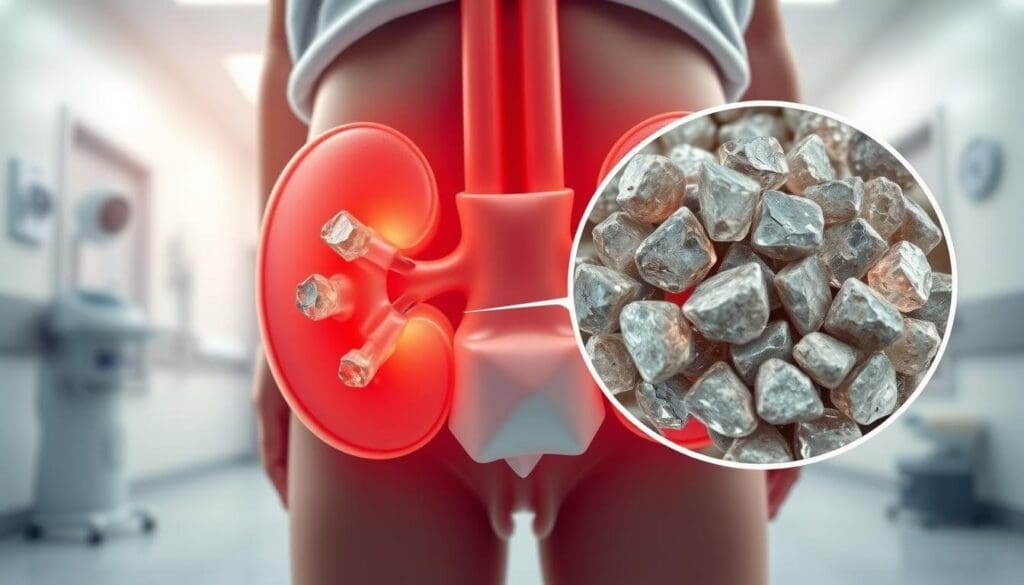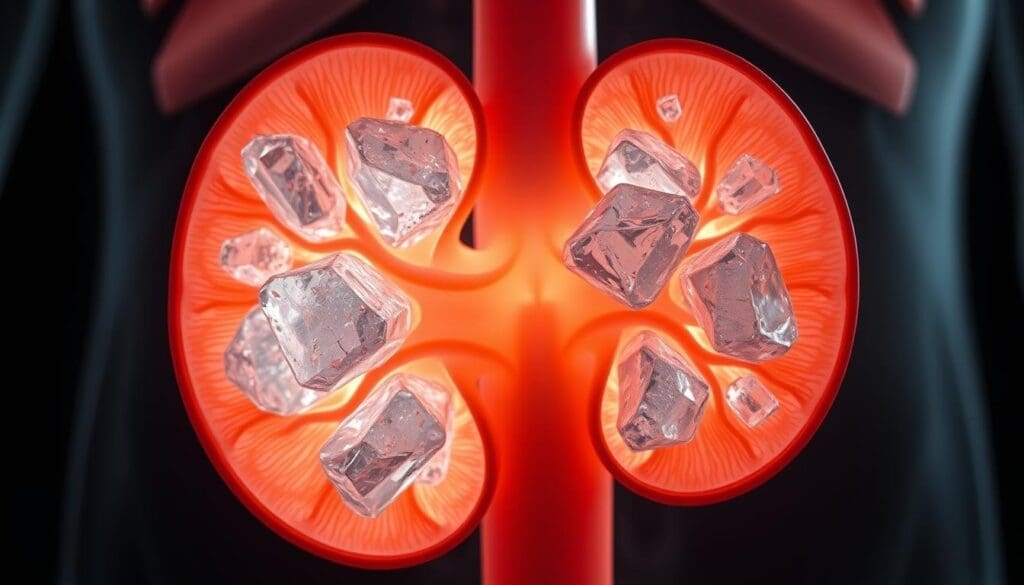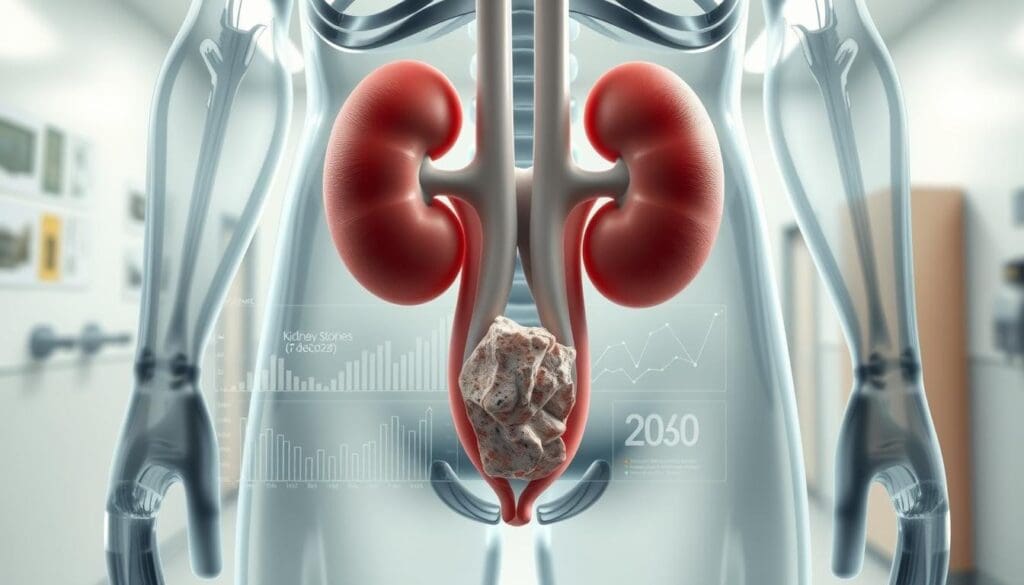Last Updated on October 31, 2025 by Bilal Hasdemir

Many people think pediatric kidney stones only happen to adults. But, research shows kids are getting them more often. This is a worrying trend.
In recent years, more kids are getting childhood kidney stones. It’s key for parents to know the signs and causes. This helps keep their kids’ kidneys healthy for the long run.
We’ll dive into the important details about kidney stones in children. We aim to give you the tools to spot symptoms and grasp the reasons behind them.

Studies show a big jump in kids getting kidney stones. This used to be rare in kids. It’s now a big deal for kids’ health and needs more study.
Kidney stones in kids, known as pediatric nephrolithiasis, used to be rare. But in recent decades, it’s become more common. This change is real, backed by studies on kids’ kidney stone rates over time.
Kidney stones in kids are rising fast, but most in teens. In 25 years, the number of 12 to 17-year-olds with stones tripled. This is a big worry and shows kids are getting more prone to stones.
The NIH says 1 in 9 people will get kidney stones. This is true for all ages. But kids getting stones more often is a bad sign and needs more study.
The table below shows some key facts about kidney stones in kids:
| Age Group | Increase in Kidney Stone Incidence | Notable Factors |
| Infants | Rare, but increasing | Dietary factors, genetic predisposition |
| Adolescents (12-17 years) | Three-fold increase over 25 years | Lifestyle changes, dietary habits |
It’s key to understand these trends to stop and treat kidney stones in kids. As we dive deeper, it’s clear we need many ways to tackle this growing problem.

It’s important for parents and doctors to know about pediatric nephrolithiasis. This condition is when kids get kidney stones. These stones can hurt a lot and make kids feel very uncomfortable.
Kidney stones are hard, mineral-based deposits that form in the kidneys. They can be tiny or quite big. Many things can cause kids to get these stones, like their genes, what they eat, and other health issues.
Kidney stones form when minerals in the urine crystallize. Dehydration, diet, and health problems can lead to this. Drinking less water makes urine more concentrated, raising the risk of stones.
What kids eat also matters. Foods high in oxalate, sodium, and animal protein can increase stone risk. Calcium oxalate stones are the most common in children.
Kidney stones in kids can be made of different minerals. Here are the main types:
Knowing the type of stone is key to finding the cause and treating it. We’ll look at causes and risk factors in more detail next.
Can Kids Get Kidney Stones? Debunking Common Myths
Recent studies have shown a big rise in kidney stone cases among kids. This goes against the old belief that only adults get them. It’s important to know the age range and factors behind this trend.
Kidney stones in kids, or pediatric nephrolithiasis, are becoming more common. These stones form from minerals and salts in the urine. They can cause a lot of pain and other problems. While adults are more likely to get them, kids are getting them more often too.
Kidney stones can happen in kids of any age, from babies to teenagers. While teens are more likely to get them, younger kids and even newborns can too. Studies show that teens are more at risk because of their diet and how concentrated their urine is.
The table below shows how kidney stones are spread out by age in kids:
| Age Group | Prevalence of Kidney Stones | Common Causes |
| Infants (0-2 years) | Rare, but possible | Congenital abnormalities, metabolic disorders |
| Young Children (2-12 years) | Less common | Urinary tract infections, metabolic factors |
| Teenagers (13+ years) | More common | Dietary factors, dehydration, family history |
Several things are making more kids get kidney stones. These include changes in diet, less exercise, and genetics. Not drinking enough water is a big risk factor. Also, some medical conditions and medicines can make it more likely for kids to get stones.
Knowing these factors helps in preventing and catching kidney stones early. Parents can take steps to lower their child’s risk. This way, they can help prevent kidney stones in their kids.
Causes and Risk Factors for Kidney Stones in Children
Kidney stones in children are caused by many factors. It’s hard to diagnose and treat them. Knowing what causes them is key to preventing and treating them.
Diet is a big factor in kidney stones in kids. Eating too much sodium can lead to more calcium in urine, causing stones. High-sodium foods and processed snacks are big offenders. Also, not enough calcium in the diet can cause stones, as calcium helps block oxalate in the intestines.
Drinking enough water is also important. Not drinking enough water makes urine more concentrated, raising the risk of stones. It’s vital for kids to drink lots of water to prevent stones.
Genetics and family history also matter. Kids with a family history of stones are more likely to get them. Certain genetic disorders, like cystinuria and primary hyperoxaluria, also raise the risk.
Medical conditions can also increase the risk of stones in kids. These include urinary tract infections, blockages, and metabolic disorders like hyperparathyroidism. Kids with these conditions need careful monitoring and treatment to avoid stones.
Lifestyle and environment also play a part. Being overweight can increase the risk of stones, possibly due to changes in urine pH and metabolism. Some medications, like diuretics and calcium supplements, can also raise the risk.
It’s important to understand these causes and risk factors to prevent and manage kidney stones in children. By addressing diet, genetics, medical conditions, and lifestyle, parents and doctors can lower the risk of stones in kids.
Recognizing the Symptoms of Kidney Stones in Kids
It’s important to spot the signs of kidney stones in kids early. This can help avoid serious problems. Knowing the symptoms helps parents and caregivers keep their kids healthy.
Kidney stones in children can cause sharp pain in the back, side, or belly. They might also have painful or frequent urination. Sometimes, there’s blood in the pee, and they might feel sick or throw up.
Young kids can’t always say how they feel. So, watching for any changes in their behavior or signs of pain is key.
How kidney stones show up can change with age. Babies might just cry a lot or not want to eat. Older kids can tell you where it hurts, like in their side or belly.
Knowing these differences helps spot kidney stone symptoms in kids.
Symptoms of kidney stones can look like other problems. This includes infections, appendicitis, or stomach issues. It’s hard to tell them apart.
Seeing a doctor is the best way to figure out what’s wrong. They can give the right treatment.
If your child has really bad pain, or if they throw up, have a fever, or see blood in their pee, get help fast. Also, watch for trouble peeing or signs of infection.
If you think your child might have kidney stones, don’t wait. Call a doctor right away.
Doctors use a detailed process to check if a child has kidney stones. They look for stones and find out why they might be there. This helps them create a treatment plan that fits the child’s needs.
The first step is a detailed medical history and physical check-up. We learn about the child’s symptoms, diet, and family history of kidney stones. This helps us figure out what might have caused the problem and what tests to run next.
To find and check the size and location of kidney stones, we use different tests and images. These include:
If a child has passed or had a stone removed, we analyze the stone. This tells us what it’s made of. We also check the child’s metabolism to find out why the stone formed.
We test the child’s urine and blood chemistry to see what might cause stones. These tests help us suggest ways to prevent more stones.
As a parent, it’s important to ask questions about your child’s care. Here are some things you might ask:
| Question | Why It’s Important |
| What is the composition of my child’s kidney stone? | Knowing the stone type helps us prevent more stones |
| Are there any underlying conditions contributing to stone formation? | Finding the cause is key to managing the problem |
| What dietary changes can we make to prevent future stones? | Changing diet can help stop stones from coming back |
| How often should we follow up to monitor for recurrence? | Regular check-ups help catch problems early |
By working with your child’s healthcare team and following their advice, you can help keep your child’s kidneys healthy.
Treating kidney stones in kids needs a special plan. It looks at the stone’s size, type, and where it is. It also considers the child’s health.
For small stones, a gentle start is often best. This means:
Drinking lots of water is key. It helps to move the stone out. Kids should drink water all day long.
Stones caused by infections or other health issues need special care. Doctors might give:
Some meds can dissolve certain stones. For example, potassium citrate helps with stones caused by low citrate levels.
Big stones or those causing a lot of pain might need surgery. Common surgeries include:
Managing pain is very important for kids with kidney stones. We use different ways to help with pain. This includes:
Good pain care makes kids feel better. It also lowers their stress and worry.
To prevent kidney stones in children, focus on hydration, diet, and regular check-ups. It’s key for kids who’ve had stones before, as they’re at higher risk.
Drinking lots of water is a simple way to stop kidney stones. Water helps dilute urine, making it harder for stones to form. Kids should drink 8-10 glasses of water a day, depending on their age, activity, and where they live.
Tips for promoting hydration:
Diet is important for preventing kidney stones in kids. It’s about finding the right balance of nutrition and prevention. Here are some tips:
Dietary recommendations:
Regular check-ups and monitoring are key to preventing stones. Kids who’ve had stones should see their doctor often. This helps keep their prevention plan on track.
Key aspects of follow-up care:
For kids who’ve had stones, it’s important to manage the risk of them coming back. This means staying hydrated, eating right, and getting regular check-ups.
By being proactive and taking a full approach to prevention, we can greatly lower the risk of kidney stones in kids. This helps them live healthier lives.
Conclusion: Supporting Your Child Through the Kidney Stone Journey
A kidney stone diagnosis can be stressful for both the child and the family. It’s not just about the medical treatment. It also needs emotional support and clear guidance.
Open communication and reassuring explanations can help. Letting children be part of their care can reduce anxiety. Working with healthcare providers is key to giving children the support they need.
Supporting children with kidney stones means more than just treating the condition. It’s about creating a nurturing environment. Parents should ask questions, understand treatment options, and follow preventive strategies.
By being proactive and informed, we can help children overcome kidney stones. Our role as caregivers is vital in making this journey easier for our children.
Yes, children can get kidney stones. This is happening more often. Kids of any age can get them, from babies to teenagers.
Kids of any age can get kidney stones. This includes babies and newborns. While it’s more common in older kids, it can happen to even the youngest.
Many things can cause kidney stones in kids. Diet, genes, health issues, and environment play a role.
Doctors use many steps to find kidney stones in kids. They look at the child’s history, do a physical check, and use imaging and stone tests.
Symptoms vary by age. Older kids might feel a lot of pain, nausea, and see blood in their pee. Younger kids might just seem upset or have belly pain.
Yes, some kids can pass stones on their own. They might need to drink a lot and take pain medicine. But sometimes, they need medical help.
To prevent stones, kids need to drink a lot of water. They should eat right and manage any health issues. Regular check-ups with a doctor are key.
Yes, finding calcium oxalate crystals in urine is a worry. It means your child might be at risk for stones. Talk to their doctor about what to do next.
Yes, kids and teens can get kidney stones. The reasons and risks depend on their age and health.
Even babies can get kidney stones. While rare, it’s possible for kids of any age to have them.
Subscribe to our e-newsletter to stay informed about the latest innovations in the world of health and exclusive offers!
WhatsApp us